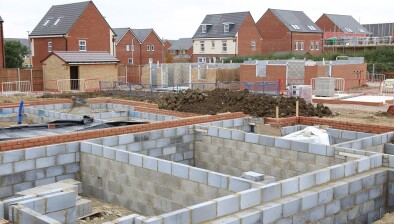ONS reveals second decrease in monthly construction output

Working days were lost due to high temperatures, this ONS said
The cost of living crisis and the searing hot weather experienced in July have been cited as the cause of a second consecutive decrease in monthly construction output.
Following the 1.4% decrease in June 2022, the Office for National Statistics (ONS) revealed today that monthly construction output decreased 0.8% in volume terms in July 2022.
The second consecutive decrease in monthly construction output, which follows seven consecutive months of growth, came solely from a decrease in repair and maintenance (2.6%) as new work saw a slight increase (0.3%) on the month.
At the sector level, the main contributors to the decrease seen in July 2022 were public housing new work, and public and private housing repair and maintenance, which decreased 13.1%, 8.0% and 2.6%, respectively.
The level of construction output in July 2022 was 2.1% (£300 million) above the February 2020 pre-coronavirus pandemic level; new work was below at 1.9% (£181m) its February 2020 level, while repair and maintenance work was 9.7% (£481m) above the February 2020 level.
Despite the monthly decrease, construction output increased 1.4% in the three months to July 2022; this came solely from an increase seen in new work (2.7%) as repair and maintenance saw a slight decrease (0.7%), and this is the ninth consecutive period of growth in the three-month-on-three-month series, but the slowest rate of growth since the three months to December 2021 (1.0%).
The ONS pointed to anecdotal evidence that continued the narrative around the increased prices for certain construction products. As in previous months, increased costs of products, most notably concrete, plaster, bricks, sand, gravel and asphalt-related products, were mentioned. There have also been continued mentions of higher fuel and energy costs, and VAT tax increases for red diesel, which have had an impact again this month. This is supported as the annual rate of all construction work price growth is 9.6% in June 2022 and is a record high since the Construction Output Price Indices series began in January 2014.
Along with high prices for construction products, businesses stated that new orders are starting to slow, with many mentioning the cost of living crisis for households and businesses as a possible reason to explain this contraction in demand. This is backed up by the recent new orders in the construction industry data, which saw a fall of 10.4% in Quarter 2 (Apr to June) 2022.
The warm weather experienced in July 2022 also saw a number of amber and red weather warnings and record-breaking temperatures across much of the country. For the construction industry, working days were lost during this time, as suggested in the anecdotal evidence from returns received for the MBS. Businesses reported that it was too hot to work because of the extreme weather conditions and record-breaking temperatures particularly seen around 18 and 19 July.
Clive Docwra, managing director of property and construction consultancy McBains, said: “July’s decrease in output in part reflects falling demand because of increasing cost of living pressures, and uncertainty over the UK economic policy given the contest over who would become the next Prime Minister.
“It has meant many clients – from households considering low-scale home improvements to investors and developers contemplating major new projects – held off committing investment.
“Supply bottlenecks are also continuing to impact, especially with materials coming from China being affected by the partial or full lockdowns in dozens of Chinese cities.
“The effect of Russia’s invasion of Ukraine is also starting to bite harder. Many construction firms were protected from the increases in energy and material prices because they used forward contracts for energy and to pre-purchase materials and products where possible, but that has merely delayed pressures that are now being felt more intensely.
“To ease the energy crisis, the construction sector would have liked to see the Truss administration support a major home insulation programme, which would not only help fix Britain’s leaky and energy-inefficient homes and help cut bills, but also provide work for smaller construction firms who are in particular feeling the pinch at present.”

















